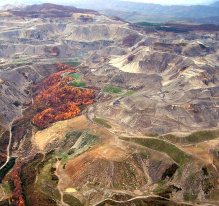
Mountaintop Removal Mining Proves Hard to Stop
Federal judges ruled EPA exceeded its authority under the Clean Water Act in regulating the impacts of coal mining in Appalachia. EPA has appealed both cases, which could have major implications for its ability to control one of the most environmentally destructive practices in the country.
- By Patrick Parenteau, Rob Glover
- Jan 19, 2013
Mountaintop removal is a form of surface mining used extensively throughout Appalachia that uses explosives to remove the summits of mountains to expose coal seams. Excess rock and soil laden with toxic mining byproducts are often dumped into nearby valleys in what are called "valley fills." The practice has destroyed more than 500 mountaintops, filled thousands of miles of streams, and clear-cut a million acres of highland forest. Peer-reviewed studies show that mountaintop mining has serious environmental impacts, including loss of biodiversity and degradation of watersheds that mitigation practices cannot successfully address.
The coal industry adopted mountaintop removal as a more efficient means of mining that requires fewer workers. Between 1973 and 2003, coal mining employment fell 40 percent as massive earth-moving equipment replaced miners.
On June 11, 2009, the Obama administration announced plans to toughen standards for mountaintop removal mining. Officials from EPA, the Army Corps of Engineers, the Interior Department, and the White House Council on Environmental Quality announced a more rigorous environmental and legal review of pending and future permit applications. Under the Clean Water Act, the Corps has lead responsibility for issuing permits, but the act gives EPA a strong oversight role in the permit process. In 2010, EPA placed a "hold" on 17 permits to review their impacts and determine whether to exercise its “veto” authority under section 404 (c) of the act.
Ultimately, after requiring additional mitigation measures, the EPA released the hold for all but one -- it vetoed the permit for the Spruce Mine, which would have been the largest new mine in Central Appalachia and for which the Corps issued Mingo Logan a Clean Water Act permit in 2007, allowing Mingo Logan to discharge "fill material" into stream segments.
After unsuccessfully seeking modification of the Corps permit, EPA initiated a 404 (c) action seeking to block the use of two stream disposal sites that encompassed a majority of Mingo Logan's discharge area. Mingo Logan filed suit, and the court ruled that once the corps issued the permit, EPA lost its "veto" power. In a harshly worded opinion, Judge Amy Jackson accused EPA of "magical thinking" in its interpretation of the Clean Water Act. Jackson felt that EPA's position would create huge uncertainty among the regulated community if permits could be revoked "after the fact."
In a second case filed in 2010 by the National Mining Association and the states of West Virginia and Kentucky, Judge Reggie Walton rejected EPA’s argument that its stream water conductivity guidance was "non-binding" and cited evidence the EPA regional offices were in fact treating it as if it were mandatory. The court ruled that EPA exceeded its authority under the Clean Water Act and the Surface Mining and Reclamation Act by imposing a stream water conductivity standard on permit requests for surface coal mines.
Both cases have been appealed to the D.C. Circuit and will be argued in 2013. There is a good chance the Circuit Court will overturn the decision in the Mingo Logan case because the trial judge simply got the law wrong. The statute authorizes a veto whenever the EPA administrator "determines, after notice and opportunity for public hearings, that the discharge of such materials into such area will have an unacceptable adverse effect on municipal water supplies, shellfish beds and fishery areas (including spawning and breeding areas), wildlife, or recreational areas." Nothing in that language says or suggests that EPA must exercise its veto before the permit is issued.
About the Authors
Professor Patrick Parenteau is nationally recognized for his expertise regarding endangered species and biological diversity, water quality and wetlands, environmental policy and litigation, and land use and property rights. Former director of the Vermont Law School's Environmental and Natural Resources Law Clinic, he continues to work with the clinic on special projects and cases. He brings years of experience and accomplishment to the clinic after having served in capacities including Vermont Law School professor, adjunct professor at George Washington University, Northwestern School of Law of Lewis and Clark College, and Dartmouth College, international lecturer, special counsel to the U.S. Fish and Wildlife Service, and commissioner of the Vermont Department of Environmental Conservation. The National Wildlife Federation selected Parenteau to receive its prestigious National Conservation Achievement Award in the Legal/Legislative category for 2006. NWF's awards program honors "individuals and organizations whose achievements in wildlife and natural resource conservation deserve national recognition." He received his BS in business administration from Regis College, his JD from Creighton University, and his LLM from Georgetown University.
Rob Glover, a third-year JD/Master of Environmental Law and Policy student from College Park, Md., is a staff editor at the Vermont Journal of Environmental Law (VJEL). Before coming to the Vermont Law School, he operated a neighborhood-based landscaping business and farmed for a community-supported, agriculture-style organic farm. He also reviewed grant applications for restoration and education projects in the Chesapeake Bay watershed. After graduation, he plans to develop locally owned, renewable energy projects and continue to ski and coach rugby.